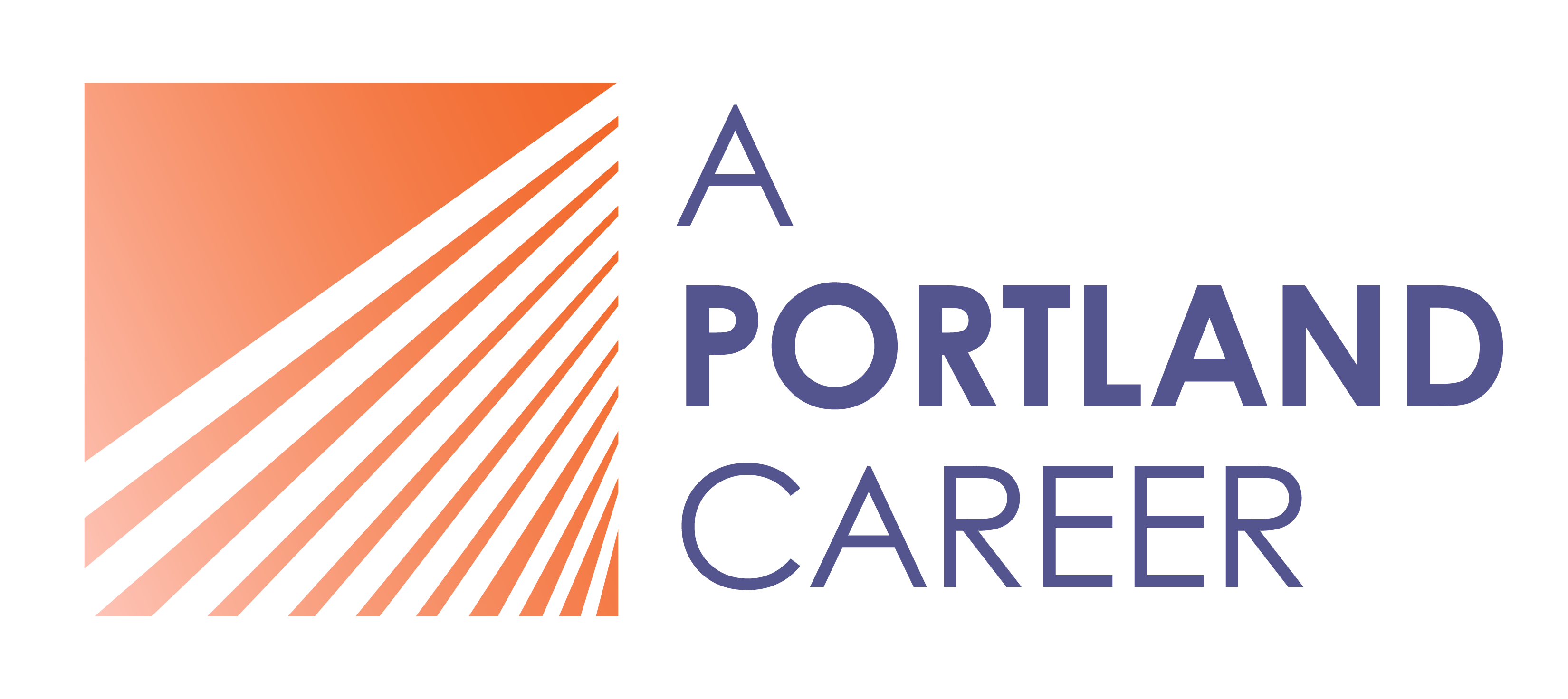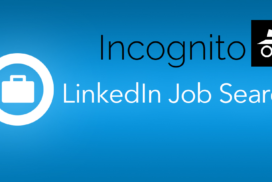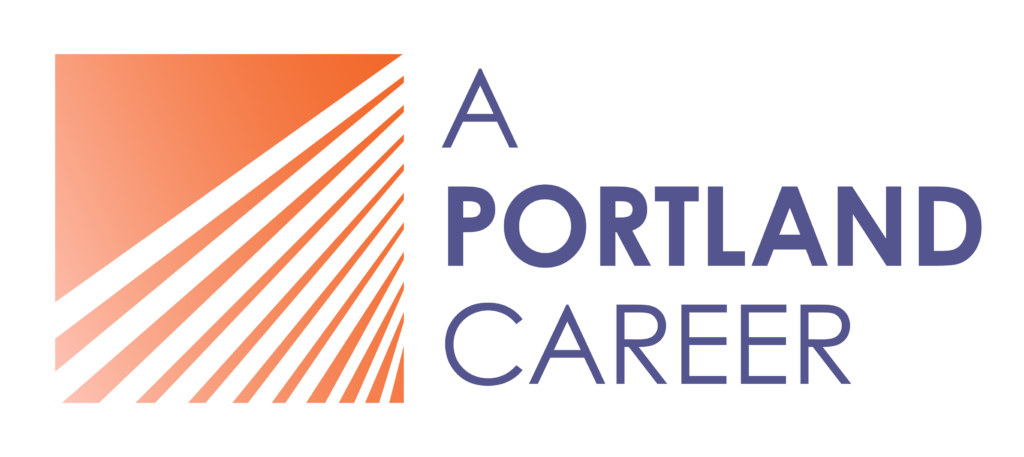Kickstart your career exploration with some strategic volunteering in fields that align with your values and interests!
Use this checklist to build your career development toolkit! It contains the practical, technology, spiritual and emotional tools you’ll need to be more effective in your career search.
The Job Seeker’s Checklist: Your Career Development Toolkit
By A Portland Career, and edited by Jelena Grove, Dan Hahn, M.S., and Suzie Sherman
Looking to level up your career development? Schedule a call, and let’s get started

When you decide to embark on a new career path, you’ll need to make sure you have all the necessary tools to keep yourself on track. To help you in your professional development and career planning journey, we’ve created a checklist (below) to help keep you organized, efficient, and stress-free as you explore new possibilities for your future.
Whether you’re fresh out of college, transitioning between careers, or embarking upon a completely new career path, there are several things you’ll need to have in place to set yourself up for success. Keep reading to find out what these things are and why they’re so important to this phase of your journey.
Home → Helpful Articles → Career Growth → The Job Seeker’s Checklist: Your Career Development Toolkit
Here are more great posts to help you along your career path, whether you’re looking to expand your skills and meet new challenges, or thrive where you are:
- How to Prepare for a Fulfilling Career: Identifying and Overcoming Career Barriers
- How to Get the Education You Need to Further Your Career
- The Tech and Social Media Skills You Need as a Job Seeker or Career Explorer
- How Strategic Volunteering Can Help You Find a Job You Love
- What’s the Difference between A Job, A Career, and A Calling?
- Career Trends 2023: What Will Impact the Job Market in the Coming Year
If you feel stuck, get in touch with us, and we’ll tailor a career growth plan to help you become the professional you want to be.
On This Page
The Job Seeker’s Checklist
In the list below, you’ll see that the left-hand column lists all the tools you’ll come to rely on to have a stress-free and productive journey. We’ll describe each tool in detail in the next section.
How to use the checklist
- For each item, write down how you plan on acquiring or manifesting that “tool” in the “Next Action” section. For instance, to create an attractive work area, you may make a note to visit IKEA to buy a desk or a new lamp – whatever you need to do next in the process of creating a proper work space.
- Next, prioritize this tool with a number from 1 to 4 with 1 being the highest priority and 4 being the lowest.
- In the Date column, write down the date on which you can acquire that tool. (if you don’t plan to implement the tool, mark it with an “X”).
- Once you’ve executed the tool, put a checkmark (√) in the Status column. Since some tools are ongoing, mark these with an “O.”
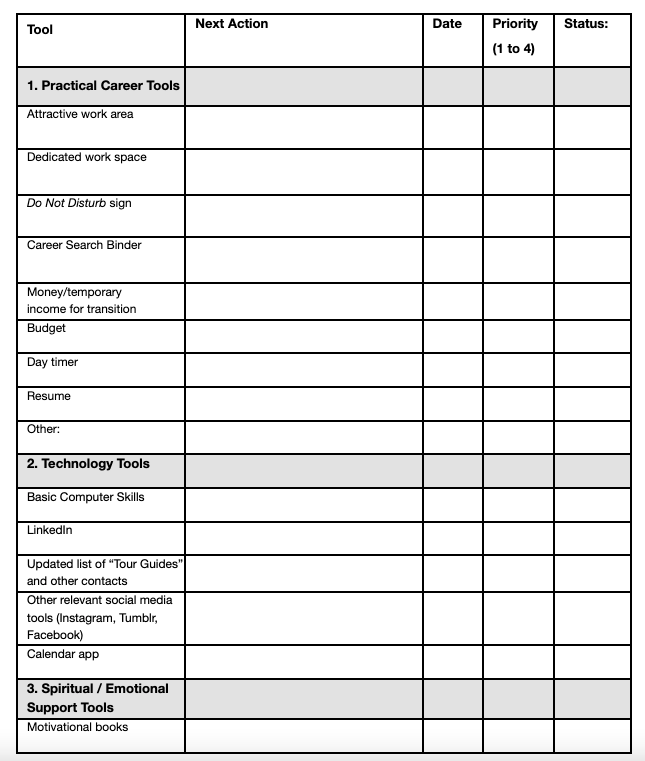
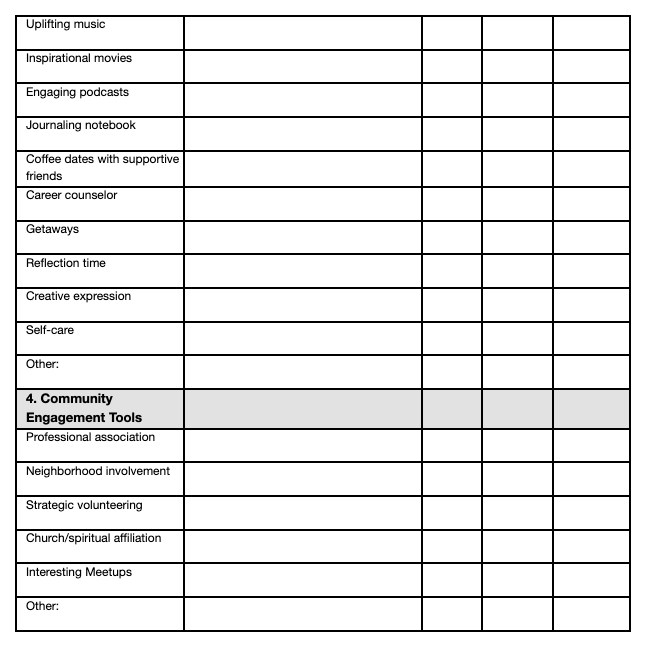
Your Career Development Toolkit in Detail
In this section, we’ll describe each tool in the checklist and why it’s important to your career journey. Let’s start from the top.
1. Practical Career Tools
Attractive work area – Set up an office area and make it a relaxing, comfortable place where you’d actually want to spend time. Decorate your workspace with whatever material that inspires you and gets you in the zone; motivating quotes, a world map, pictures of loved ones, plants––you get the idea.
Dedicated work space – Create a space that will allow you to work without interruption, preferably a place where you can close the door and work quietly. Even a closet is fine as long as it’s a place where you can store your Career Search Binder and other career transition tools. Make it as clear as possible that people you live with should respect your work area; they should not remove materials when you are gone or leave behind their discarded banana peels and yogurt containers.
“Do Not Disturb” sign – If you have the luxury of a door, slap that baby on the door knob when you’re working in your space. People will interrupt you as much as you allow them, so don’t be afraid to be firm about your time and space needs.
Career search binder – Grab yourself a sturdy 3-ring binder from any old office supply store to get started organizing your individual development plan. You can use Tul calendar pages and accessories (available at Office Depot) to build a custom career binder that will work best for you. Use your binder to keep your job search materials, informational interview questions, job descriptions, skills assessment printouts, resumes, and a calendar page together for easy access.
Money for the transition – Most of us aren’t Rockefellers and need to bring in at least some income to cover our basic expenses. We recommend a part-time job if you can swing it. If you must work full time, be sure to carve out at least four hours of uninterrupted time on the weekends for your career development journey.
Budget spreadsheet – We think it’s helpful to outline a rudimentary budget to see where you can cut back on spending to avoid full-time employment, if possible. At a minimum, it is a useful exercise to give you a sense of how much you would like to make in the coming years. Also, it can help you determine if options like going back to school or completing a training program are possible.
Resume – We don’t want you to worry too much about polishing your resume yet, but we recommend digging up your latest draft or template so that it’s easily accessible if you do need it. Review it to remind you of your accomplishments and skill sets, and to boost your confidence. It helps to have your resume’s contents committed to memory to inform the writing of cover letters and your development plan.
Day timer – Treat yourself to a novelty egg timer shaped like a cat or an actual egg to decorate your work space and track a set amount of time per day for your career-transition work.
2. Technological Tools
Basic computer skills – Many community colleges and workforce centers offer free and low-priced computer classes. At the very least, brush up on Microsoft Word and Excel. For extra mileage, add a database program like Filemaker Pro, and if you are creatively inclined, Adobe Creative Suite programs like InDesign, Illustrator and Photoshop. (Private art colleges and community college often offer reasonably-priced classes in Adobe products.) There are also project management and time management programs like Trello, Asana, Harvest, and Toggl that make organizing projects and tracking time a breeze.
LinkedIn profile– Because 93% of hiring managers and recruiters use LinkedIn and a staggering number of people (over 2 billion as of March 2022) are using Facebook, it simply makes sense to join the bandwagon and access the trove of career development tools they have available. There are several outside-the-box ways to use LinkedIn for career exploration that may surprise you (beyond the millions of job descriptions and postings, networking possibilities, and job market research opportunities).
Career “tour guides” and other contacts – Create a spreadsheet of your contacts and indicate which ones are your metaphorical “Tour Guides.” All of your contacts are important, and you’ll want to reach out to them in due time. Your Tour Guides, however, are those special people who either completely have your back and can answer your FAQs, introduce you to careers, mentoring opportunities, and fields you wish to explore further.
Calendar app – Unless you’re religiously committed to a paper calendar, consider using an online calendar tool. We like Google Calendar, but Microsoft Outlook and Apple’s iCal are also popular. If you’re a smartphone user, download the corresponding calendar app so you’re ready to schedule something wherever you are. Whether you go high tech or kick it old school with a paper calendar, be sure to block out time for self-care, reflection, coffee dates and getaways. (Keep reading to find out more about these.)
Career assessment tools – Self-assessment quizzes can be helpful resources for you to use at the beginning of your career journey. For example, the Myers-Briggs or Holland Code tests may help clarify certain elements of your personality in relation to your career, which you may find valuable as you explore your career goals, competencies (like hard and soft skills), and prepare for job interviews.
3. Spiritual / Emotional Support Tools
Self-care practices– Arguably all the tools listed in this section are examples of self-care initiatives, which we believe is best approached as an overall mindset. By prioritizing your needs for exercise, self-expression, time to yourself, time with friends, and a mindful approach to life, you will improve your cognitive reasoning abilities and lower your stress and anxiety levels.
Mindfulness – Humans have a way of tuning out from the world when asked to perform routine tasks that no longer require higher level thinking. Mindfulness is a Buddhist-inspired practice of paying extra attention and seeing the world like a child does, as if you were experiencing things for the first time. Meditation and yoga, while the most obvious mindfulness practices, aren’t the only approaches – walking, painting, swimming, or just noticing a beautiful view are all excellent mindfulness habits.
Motivational books – Kristin’s favorites include Martha Beck’s Finding Your North Star, Carol Eikleberry’s The Career Guide for Creative and Unconventional People, and, if you’re entertaining the idea of starting a business, Chris Gillebeau’s The $100 Startup.
Uplifting music – We don’t know about you, but nothing gets our mojo going like a lively tune. When Kristin is feeling blah, she cranks up British pop or punk music – Chumbawamba’s Tubthumping always gets her going.
Inspirational movies – It’s Kristin’s strong conviction that we need stories like we need food. Even silly movies can provide guideposts to help us figure out challenging conundrums or just take our minds off our problems for the moment. (Thank you, Will Ferrell.)
Engaging podcasts – Podcasts like Serial have kick-started the audio medium, and we think it’s fantastic. You can learn all kinds of things while folding your laundry, walking the dog, or drifting off to sleep. You can learn insider information about your target industry or career, or about the job search process in general (like the Career Tools podcast). We get re-energized by podcasts like Ted Radio Hour, Fresh Air, and The Jealous Curator.
Journaling notebook – A character in Bram Stoker’s Dracula says, “Journaling is like whispering to one’s self and listening at the same time.” It may seem a little woo woo, but writing does have the unique power to reveal what you’re really thinking.
Coffee dates with friends – I’m not sure this needs much explaining, but it is something that we don’t always think to chisel into our schedule, especially if we’re spending a lot of time at home. Spending time with friends is one of the best ways to recharge your emotional batteries and feel more connected, more supported, less lonely, and less stressed. Make time for your friends, and don’t hesitate to ask for their help and insight. You may discover some things you never knew about yourself, your job, or your situation overall.
Career counselor – Your friends and family, even if they’re incredibly supportive, can help you only to a point. When it’s time for objective assistance with a career transition, career counselors can help you sort through the torrent of thoughts that can overwhelm and befuddle even the most together person, identify skill gaps, navigate job boards, and create a personalized professional development program and action plan.
If you haven’t found one yet––you’re in the right place. At A Portland Career we have a dedicated team of career development and decision-making experts who offer in-person, phone, and video call sessions for those looking to get more clarity in their career journey. Contact us to schedule a consultation, and see how we can help you in your unique situation.
Relaxing getaways – We are big fans of road trips, but if this proves impossible, little day trips are invaluable at this time to open up your thinking and initiate the wonders of unconscious thought processing. Take yourself to those places you only take your sister when she’s in town and try to appreciate them like a tourist. Even city parks are wonderful places to encourage mindful appreciation of the world and give yourself a psychological reboot.
Reflection time –This can be done during your getaways and your journaling sessions, but it also can be done by waking up before everyone in the house to take advantage of that precious silent time. We advise all of our clients to take time for reflection, and recommend taking focused, uninterrupted time to do it. Use your calendar app or planner to schedule reflection time and promise yourself you’ll honor your appointment.
Creative expression – If you’re the least bit creative and you’re not making time to express your gift, you run the risk of turning your creative energy into inward frustration, which can lead to depression or anxiety. If you’re a social media fan, a great way to commit to a creative outlet is to take a photograph or draw a picture daily (or weekly) and post it on Instagram, Twitter, and/or Facebook with a descriptive, original hashtag like #picturesofwindowsinportland. Of course, you don’t need to publicize your creative endeavors at all. Even writing down your feelings on a piece of paper and burning or shredding it after can be a wonderful outlet for creative energy and idea generation. It doesn’t matter how you get your feelings out––it just matters that you do.
4. Community Engagement Tools
Professional associations – Attending the meetings of professional associations and networking groups is a great way to get yourself out in the world to make contacts and learn more about alternative career options and new job opportunities. Collect business cards and follow up promptly to set up coffee dates and connect on LinkedIn and other appropriate social media.
Neighborhood involvement – Neighborhood associations are often the source of outstanding community projects, like farmers’ markets and street fairs, that offer a robust way to forge connections and build marketable skills. Kristin helped start a farmers’ market in her neighborhood in Portland, an experience she counts among her proudest accomplishments and the source of several lifelong friendships.
Strategic volunteering – Find a cause about which you’re passionate and offer to volunteer a skill you are looking to build. Nonprofits and grass roots political organizations are constantly looking for people to help with marketing, social media, events, and community outreach. Be willing to help out with less flashy tasks like stuffing envelopes or making phone calls. Once they see you’re consistent, reliable, and offer good ideas, they’ll likely give you more challenging responsibilities.
Church/spiritual affiliation – When Kristin goes on road trips to clear her mind, she actually thinks of the places she stays as “temples”. These are the homes of good friends and family who know her well and love her unconditionally. If you have a place of worship, consider ways to volunteer your time and skills there to meet more people and build deeper relationships that will serve you during times of extreme challenge. If you don’t have a place of worship, Unitarian and Quaker churches are incredibly welcoming to people of all faiths and beliefs. Your spiritual place doesn’t have to be a church, synagogue, or mosque; a Buddhist temple, LGBTQ community center, or a martial arts studio might be a place that feeds your soul. These are just a few organizations where communities of kindred spirits flourish.
Interesting meetups – Whatever your interest, there is a Meetup for you: Men Who Love Cats, Lesbians Who Knit, or UX Website Designers, to name a few. Meetups are great for introverts and extraverts; they are gatherings where you can find a tribe that shares your quirky pastimes and deep-seated interests. Like the author of Never Eat Alone, we believe networking is best done with people who love what you love. If you like to kayak, watch World Cup soccer, or draw Manga characters, the social settings you share are all networking opportunities.
Final Thoughts on Your Career Development Toolkit
We understand the impulse to dive in and get started right away. Just know that you’ll be more successful if you take the time to acquire some of the tools we listed here. We recommend you take it slow, bookmark this post, and return to it as often as you need to as you tick off the boxes you need for your individual situation (or simply print it out and store it as the first page of that career search binder you’re going to buy).
Work steadily on the your Job Seeker’s Checklist, but don’t let its lack of completion keep you from moving forward. You can take practical steps towards your career transition while using and building on the tools you think are helpful. We want you to take advantage of your internal momentum as it builds!
Don’t worry: We don’t expect you to use all the tools we list here—that could be a bit overwhelming. We know that you know which tools will serve you best.
Key takeaways
- There are practical, spiritual/emotional, technology, and community engagement tools you can use to make your career search fruitful and productive
- Create a dedicated, private workspace where you can keep all your career materials nad resources together in one place
- Technology is your friend: between project management and organization tools, LinkedIn, and creative technology, you can make the most of your networking efforts and build your hard skills
- Don’t forget to make time for relaxation, meditation, and socializing with your friends and family
- Tap your community for help in your journey, whether you’re a part of a church, a professional or neighborhood association, or volunteering group
Related articles you might be interested in:
The Tech and Social Media Skills You Need as a Job Seeker or Career Explorer
Resistance is futile! Get comfortable with workplace tech and make it part of your career development plan!
LinkedIn For Job Search: 10 Powerful Tips To Find Your Next Job
Optimize your LinkedIn profile to wage an effective job search—without your current boss finding out.
7 Ways to Make Money for Your Career Change and Still Pay the Bills
Changing careers is a full-time job in itself, on top of just paying the bills. Here’s 7 great ways to make money during your transition to a new career.
